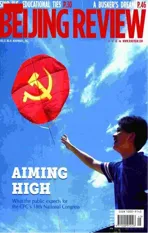MARKET WATCH
2012-12-21
MARKET WATCH
OPINION
No Basis fo r Con tinuous Ap p rec iation
In the first three quarters of this year, and especially since mid-late July, the spot exchange rate of the yuan experienced a reversal from continously dropping to slow ly appreciating. In October, the spot rate and the central parity rates of the yuan kept surging, and especially at the end of the month, the spot exchange rate of the yuan against the U.S. dollar touched the upper limit of the daily floating range for several days in a row, hitting a record high since the 1994 yuan exchange rate reform.
Nevertheless, continuous appreciation of the yuan is not sustainable given that China’s economic fundamentals have remained unchanged.
The soaring yuan is as a result of easy liquidity across the globe. Since the third quarter, a deteriorating sovereign debt crisis in combination w ith stagnant economic grow th or even recession have forced nations back to a policy of maintaining grow th.
According to studies by Morgan Stanley, 16 out of 33 central banks have adopted easing measures; 7 out of 10 developed economies resorted to easy money policies; 9 out of 23 major emerging countries implement loose monetary policies like lowering their benchmark interest rates or reserve requirement ratios. In the face of mounting debt, the central banks of developed countries elbow for an edge in a contest of quantitative easing.
In contrast to these unconventional monetary policies favored by major economies, the People’s Bank of China has frequently injected liquidity into the market through “reverse repos,”resulting in higher benchmark interest rates in China than in the United States.
Such a gap leaves large arbitrage space for offshore funds to tap into, stimulating the backflow of overseas yuan funds.
Central banks across the world currently hold assets worth of $18 trillion, accounting for 30 percent of the global GDP, two times as much as the level 10 years ago.
Despite a relative surplus of global liquidity,there is still a long way to go in “de-leveraging”and “eliminating debts.”
Meanwhile, the financing gap of the U.S.dollar remains large. According to calculations from the Bank for International Settlements, the euro zone sovereign debt crisis coupled with the slowdown of the global economy have raised the demand of the U.S. dollar for averting risks, and by the second quarter this year, the demand for the U.S. dollar had reached its highest level since 1999, enlarging the gap to $2 trillion, five times as much as that in 2008. Pressure for a credit squeeze is common in the entire global financial system.
One uncertainty that affects the global exchange rates is the approaching U.S. fiscal cliff.When the U.S. general election w raps up, the U.S.Congress will have seven weeks to tackle problems deriving from its fiscal uncertainty.
Even if a compromise is reached between the Democrats and Republicans, it’s unlikely to be sufficient to tackle the country’s fiscal cliff in the short run. Once risk events break out, the U.S.dollar will again assume the role as a shelter currency, and then the appreciation of the yuan will be reversed.
Moreover, in terms of purchasing power parity and productivity, the yuan is now floating in the range of an equilibrium rate of exchange;China’s international trade balance is at an equilibrium level; and the economy’s endurance for a rising yuan is limited. In this sense, it seems difficult for the yuan to continue appreciating.
THE MARKETS
Investm en t In ten tion
Baidu Inc., China’s biggest online search engine, is hoping to better position itself for a major Internet m igration from personal computers to mobile devices.
The company w ill accelerate its pace of investment, including possible mergers and acquisitions (M&As). It w ill invest in “key businesses and products, key personnel, key partners and core infrastructure facilities.Prudent M&As will continue to complement organic investment, particularly in mobile and cloud technology and vertical content,” said Jennifer Li, Baidu’s CFO, on October 30.
The company w ill further develop its mobile business by providing mobile applications-based advertising and developing location-based services, according to Robin Li, Baidu’s Chairman and CEO.
China’s online advertising market has been hit by the nation’s slow ing econom ic grow th. Major Internet companies have seen a reduction in advertising revenue this year.
Pe tro chem ica l A cqu isition
Sinopec International (Hong Kong) Co.Ltd., the wholly owned subsidiary of China Petroleum and Chem ical Corp. (Sinopec), and SIBUR, a Russian gas processing and petrochemical company, signed an agreement that w ill see Sinopec purchase 25 percent plus one share of Krasnoyarsk Synthetic Rubbers Plant JSC (KSRP). The deal is subject to approval by Russian and Chinese regulators.
Earlier the parties signed a joint-venture agreement to produce nitrile rubber at KSRP.Joint projects to produce nitrile and polyisoprene rubbers in Shanghai, whose annual capacity for each type of rubber is currently estimated at 50,000 tons, are currently in discussion.
This is an edited excerpt of an article by Zhang Monan,an associate researcher w ith the State Inform ation Center, published in theEconom ic Information Daily
